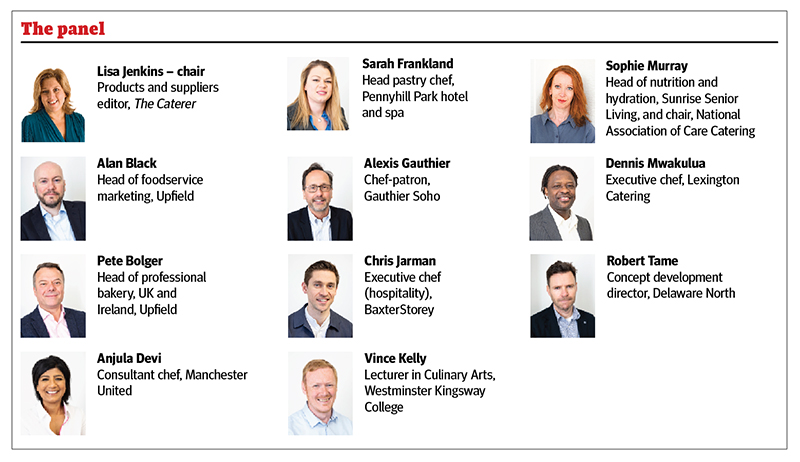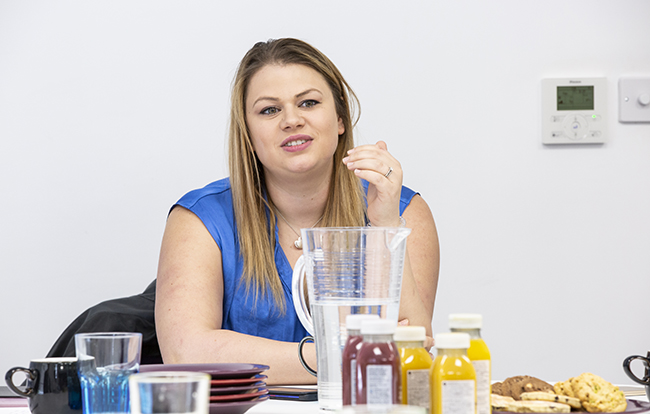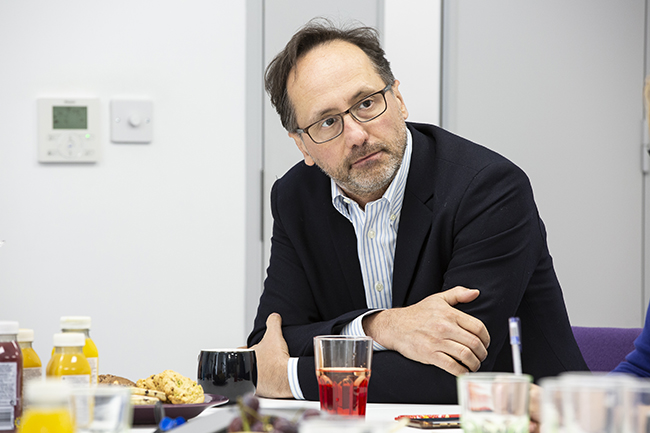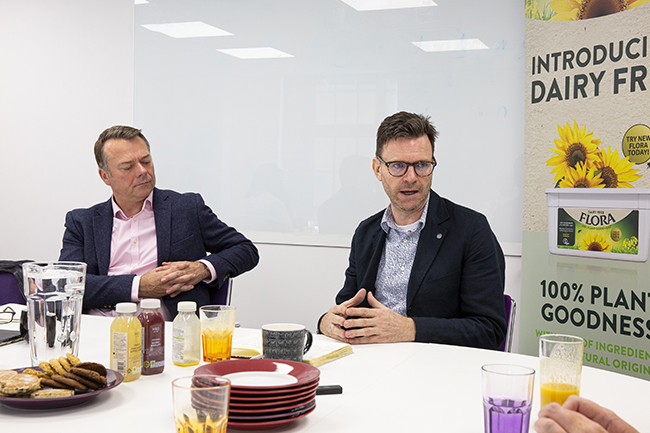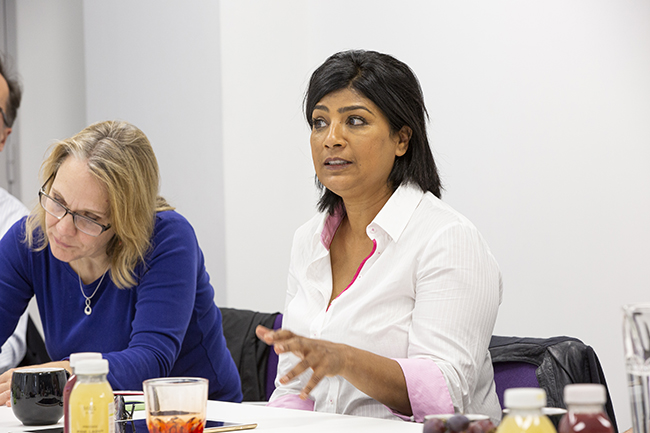The future of free-from food
The recent deluge of diners' dietary requirements means that chefs and recipe developers have had to innovate to please their customers and always stay one step ahead. So, a panel of industry experts gathered to discuss the latest innovations in plant-based and allergen-free foods at The Caterer's roundtable, in association with Upfield. Anne Bruce reports
As an operator, how have you been affected by customers' allergen and dietary requirements and the increase in plant-based eating?
Sarah Frankland (SF):
Dennis Mwakulua (DM): In the corporate market clients are focused on dietary requirements. They want foods that are free from everything, for example a vegan, gluten-free croissant. The challenge is to convince consumers to move away and try something new. We are launching a product with acai berries from Brazil, for example.
Sophie Murray (SM): We have to remember we are adding to the already pressured role of a chef. We try and embed allergen-free food and vegetarian choices into the normal menu; adding the odd food is not as much as a problem for the chefs. It's the same way that the campaign to reduce sugar was done through the backdoor.
Chris Jarman (CJ): We have ingredients in our armoury with interesting flavours and textures, such as herbs or pickles. If you have a vegan in with special dietary requirements, you can give them something they have not seen before - maybe a nice dressing or a new ingredient.
Alexis Gauthier (AG): A few years back I became vegan and decided to take my restaurant in that direction. As a classically trained French chef, being creative around plant-based menus is like discovering another planet.
Modern humans use their diet to define themselves, and as operators we have to accept that this is the future and be open minded. I love to be able to give pleasure in my restaurant, and the diners pay a lot of money for that. With plant-based menus customers pay more for the chef's creativity.
Is there a skills gap in kitchens with the growth of plant-based and special diets?
CJ: For me as an executive chef, trying to get the guys in the kitchen as excited about this as me is a challenge. It is tricky to get a classically French-trained chef to understand that we have to create a gluten- and dairy-free dish.
A new world opens if you experiment -for example, we've made macarons with chickpea water. When you have worked in the industry for a long time it's exciting to try new things.
SF: Training is an issue. We had 15 different dietary requirements on Saturday for afternoon tea. There are no training courses for this - what the guests want and my own interest in the subject pushes me.
Vince Kelly (VK): I can really see this being an issue in the industry. I'm hoping to launch a set of continuing professional development modules [on innovative plant-based cookery] early next year. We only get funding from the government for research or planning if it's on the curriculum. I've managed to get four hours a week on "healthy plate, healthy planet", with students in level one. I am trying to get it to level two as well.
Is there confusion in the industry around the labelling of special diets and what they do?
Sophie Murray (SM): Among our staff there is a lot of misunderstanding of terminology such as flexitarianism. By sticking to terms like fibre, flavour and texture, the benefits of plant-based diets are clear.
How do you promote healthy choices?
Anjula Devi (AD): Authentic Indian food is vegetarian-based, made using pulses and lentils, not chicken or lamb. I teach people how to make a well-balanced meal. We use mango powder to reduce sugar and unrefined sugar cane. It's about knowing how to deal with new ingredients.
SF: We have a âlife in balance' concept for conference coffee breaks and our spas, so guests can choose either a âhealthy' or indulgent snack option. It is really popular - guests just want choice.
SM: We only have 1% of people who are vegetarian or vegan in care homes, but we are trying to push the health benefits of plant-based diets.
Robert Tame (RT): Customers want something tangible; they want to know about calories, fat, sugar and what the positive impact will be, and that makes sense to me.
What is the impact of social media and âinfluencers' on plant-based eating?
SF: Everything today is connected to social media. The problem from a chef's point of view is that Instagram does not show the process needed to get to the end picture.
DM: Social media can be used to launch new products. You'll put something on the menu very quickly if there is a big response. You can start to live on the likes.
AD: Hints and tips get the biggest hits on our Instagram page: we can get 55,000 hits in a morning.
How do you see plant-based eating developing?
RT: We are trying to bring plant-based into the mass market; we created a plant-based menu as an experiment at one of our stands at Wembley Stadium for the NFL. We created a veggie hotdog with caramelised onions and we really focused on the âdirty', delicious aspect. Some people didn't even realise they were vegetarian. In that market it is one step at a time. People aren't going to want a kale sandwich.
AG: This whole thing is going to happen when the mass market wants it, when it is delicious-looking and enticing. It's going to be much cheaper for the operator when it's done on a grand scale and then the planet will say thank you too! The Impossible Burger from Impossible Foods in America is without meat and is the best I have ever tasted and does not taste synthetic.
Alan Black (AB): In the US the focus is on developing an analogue to meat, looking at lab-grown meat as a more ethical and efficient way. In Europe it's a different approach, thinking about a dish without meat at the centre, using a palette of ingredients.
AG: For me, I think we have to rewrite the rules, not create a mock version of a product. The UK plant-based sector is much more dynamic than in France. It is such an opportunity for Britain; we have the creative power and the demand. The curriculum in colleges can't keep up with the change. Even Lidl has a vegan salad for 69p - or look at Greggs' vegan sausage roll. We can be a leader, just as Spain was a leader with molecular gastronomy. The world is our oyster.
What do our chefs have in the larder to add pizzazz to their plants?
AD: Asafoetida, when plunged into oil, delivers an amazing garlic and onion flavour. It's quick and it's great for clients with garlic and onion avoidance. It can reduce labour time in cooking traditional Indian food.
SF: I am using a lot of inulin to reduce sugar in pastry. Another good one is potato protein; you can make mousses and sponges and macarons because potatoes have aeration properties similar to egg white.
AG: Fresh kaffir lime - we grate it raw on a plate of vegetables and it gives a beautiful flavour.
CJ: British birch syrup is tapped like maple syrup and it can add acidity to sauces. It also sets off cheese and truffle amazingly.
VK: You should value seeds. Dehydrated raspberry seeds can make lovely crisps, full of nutrient value. Or you can use dehydrated nettle seeds in salads. I teach a lot about seaweed hydrocolloids [a gelling agent]. They are great for texture in vegan, dairy-free or gluten-free recipes.
SM: Probiotics are so important in the diet. Kombucha could easily be brought into the menu, especially in summer. And peas are so high in fibre - whack the peas in and you will get your daily fibre content.
DM: I use baobab powder as a thickener, and cassava powder is also great for texture and will never split a sauce. Sweet potato powder gives a natural sweetness - I have used it to make a crème brûlée!
RT: Synthetic bacon is not satisfactorily salty with a veggie burger, but seaweed bacon gives you that salt hit and crispness.

Upfield is a global leader in plant-based nutrition and has an impressive portfolio of iconic brands including Flora, Stork and Meadowland. Upfield is committed to delivering its customers with great tasting products consumers will love.
The reformulation of Flora to be purely plant-based validates the company's vision to deliver âa better plant-based future', while also demonstrating its support for operators when it comes to catering to evolving consumer demand, as more and more consumers decide to follow flexitarian and specialist diets.



